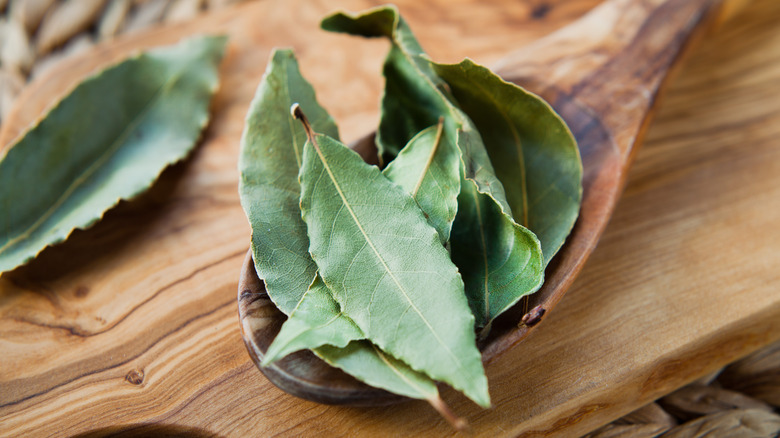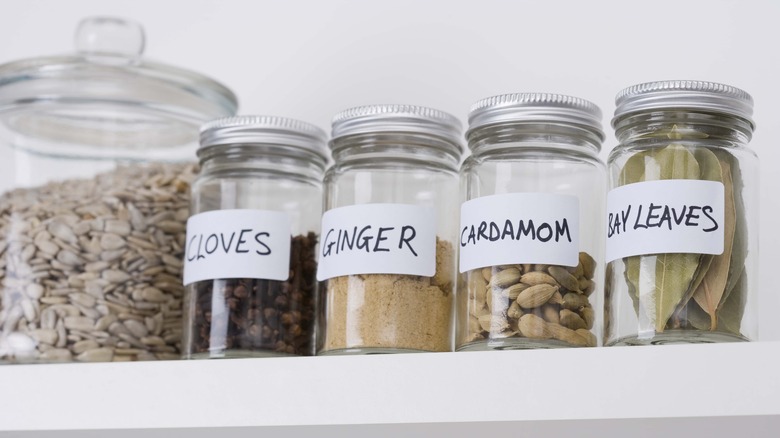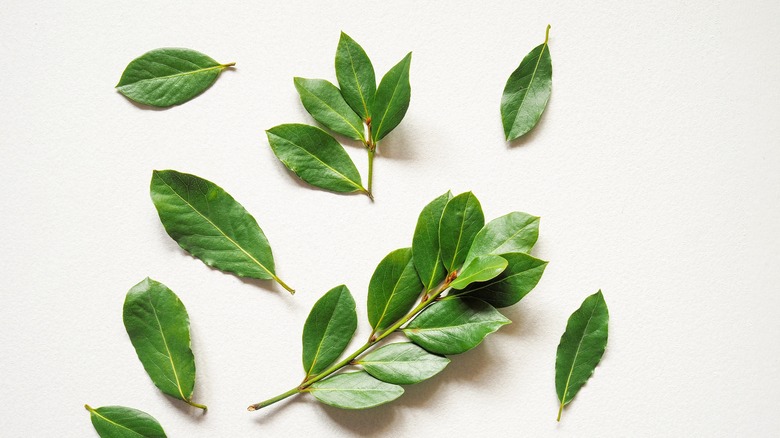How Long Do Bay Leaves Last?
Sometimes, as a budding home cook, you do things because you think you're supposed to. You dutifully follow up a dash of salt with a few grinds of black pepper as if the two ingredients can't live without each other, when in reality — as University of the Pacific history professor Ken Albala tells NPR – their pairing was "a weird accident of history." The same might apply to the dried bay leaves you automatically add to soup and stew without questioning the true purpose of the brittle spice.
Indeed, despite its prominence in cuisines across the globe, the humble bay leaf is often overlooked. You might drop one in a pot of simmering broth out of a sense of obligation, questioning whether or not it actually adds any flavor. Reader, it absolutely does.
Plucked from the branches of the bay laurel tree, which is native to the Mediterranean, the slight menthol flavor that defines a fresh or dried bay leaf can infuse dishes with "a subtle flavor" with notes of black tea, oregano, and thyme (per the Auguste Escoffier School of Culinary Arts). Unlike other whole herbs — even dried woody ones, like rosemary — bay leaves can stick around for quite a long time without losing their staying power.
A longterm tenant of your spice rack
When you're shopping for dried bay leaves, you'll most likely see them in glass jars with a headcount of about a dozen. Like the other denizens of your spice cabinet, it's best to store bay leaves in an airtight container in a cool, dry place where they can't soak up excess moisture. In the safety of your spice drawer, they can last up to three years (per FoodsFate). After they've passed their prime, or have gone stale, you won't know it from the usual signs of spoilage, like mold. Rather, an old bay leaf simply won't impart much flavor to your dish. If you're not sure how long they've been in your kitchen, give them a whiff and see if you can detect a slightly woody, minty flavor. If not, it's time to restock.
Fresh bay leaves, on the other hand, won't last as long. According to the food blog Lucky Belly, fresh leaves should be stored in a Ziploc bag in the fridge for no more than three weeks. If your fresh leaves start to look wet, it means they're out for the count. "Moisture causes fresh leaves to decay and go slimy," says the blog.
Not just for soup
While bay leaves are known for adding complexity to soup and stew, they also do wonders in other applications, either fresh or dried. In her recipe for salted vanilla bean caramel candy, culinary creator Sohla El-Waylly steeps bay leaves in cream, adding an herbal twist to the sweet treat. Likewise, Masterclass says some chefs add bay leaves to rice pudding mixtures, "infusing the dessert with a subtle herbal flavor."
You might also use bay leaves to enhance the flavors of any rice dish, such as the South Asian staple biryani. "If you take a deep whiff of a bag of good, fresh bay leaves, you'll first get a slightly spicy, pungent earthiness that tingles at the back of your throat," writes Mike Bierschenk in a recipe for bay leaf rice on the food blog Optional Kitchen. That, plus the "sharp, almost citrusy note" that accompanies it, makes the bay leaf a perfect addition to a buildable dish.


